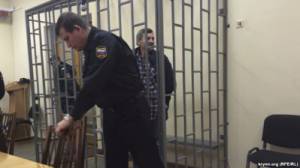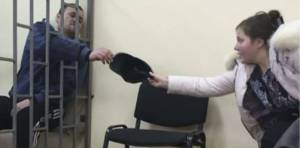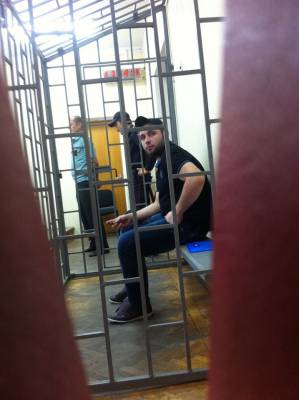Open Lawlessness as Terror against Crimean Tatars
 Crimean Tatar leader Akhtem Chiygoz has been held in custody since Jan 2015 (Photo: Radio Svoboda)
Crimean Tatar leader Akhtem Chiygoz has been held in custody since Jan 2015 (Photo: Radio Svoboda)
All of Russia’s Crimean victims have had to confront varying forms of lawlessness, but none demonstrates contempt for the law quite so flagrantly as the criminal proceedings against Crimean Tatar leader Akhtem Chiygoz and other Crimean Tatars.
The entire case is illegal under Russia’s own legislation, since the charges are under Russia’s anti-protest laws, yet pertain to a pre-annexation demonstration over which Russia has no jurisdiction;
Only Crimean Tatars are targeted although there were also pro-Russian demonstrators present on Feb 26, 2014.
There is no evidence against any of the three men who remain in custody yet court after court has extended their detention.
Natalya Poklonskaya, installed as prosecutor after Russia seized control in Crimea, announced on Dec 7 that the case against six Crimean Tatars had been sent to the court. Typically, although 6 defendants are mentioned, the charges listed are against Akhtem Chiygoz, Deputy Head of the Mejlis of the Crimean Tatar People. He is accused of having organized “mass disturbances” outside the Crimean Parliament on Feb 26, during which two people died.
No legal jurisdiction
According to Russia’s Criminal Code (Article 12 § 3), a criminal prosecution can only be initiated against foreign nationals who committed an offence on the territory of another country if “the crime was directed against the interests of the Russian Federation or a citizen of the Russian Federation.”
Chiygoz has been held in detention since Jan 29, two other men for over 6 months, in connection with ‘a case’ that Russia’s own law prohibits.
Against Crimean Tatars and specifically the Mejlis
Chiygoz is the highest ranking leader of the Mejlis remaining in Crimea, after Russia banned Mustafa Dzhemiliev and the Head of the Mejlis Refat Chubarov from their homeland. His arrest is impossible to not view as part of a major offensive against the Mejlis which has been unwavering in its opposition to Russia’s occupation and which holds enormous authority with the vast majority of Crimean Tatars.
 Ali Asanov is not able to see his children, the youngest of whom was born in June, after his arrest
Ali Asanov is not able to see his children, the youngest of whom was born in June, after his arrest
There are strong grounds for concluding that the two men also in detention - Ali Asanov and Mustafa Degermendzhy – have been put under enormous pressure to testify against Chiygoz, and may be still held in custody as punishment for refusing.
The protests
There were around 10 thousand Crimean Tatars and Maidan supporters who gathered outside the parliament building in Simferopol on Feb 26, 2014, fearing that plans were underway to push through a bill changing Crimea’s status. They were opposed by a smaller, but still considerable, number of pro-Russian demonstrators led by Sergei Aksyonov, then the leader of a marginal pro-Russian party in the Crimean parliament. Aksyonov was installed as self-proclaimed leader on Feb 27 after Russian soldiers seized control of government buildings, etc.
Radio Svoboda reported at the time of Chiygoz’s arrest that their video footage clearly showed all representatives of the Mejlis seeking only to calm the crowd and prevent bloodshed. This was also confirmed by a Russian journalist Pavel Kanygin, writing for Novaya Gazeta, and present during the demonstration on Feb 26, 2014 He reports that Refat Chubarov used a megaphone to call for calm after the first scuffles broke out. Later, after the parliamentary session believed to be planning to take control was cancelled, Chubarov and Aksyonov came out together and called for calm and for the demonstrators to disperse. Kanygin adds that the Crimean Tatars heeded this call, not the pro-Russian demonstrators who remained and kept chanting “Russia!” One of the two people who died was reported to have had a heart attack.
 Mustafa Degermendzhy
Mustafa Degermendzhy
Terror and intimidation
There is no justification for holding any of the three men in custody. Ali Asanov, in particular, has four small children, one born after he was taken into custody, and an elderly father, all of whom he is prevented from providing for. Chiygoz has made it quite clear that he sees this case as aimed at terrorising Crimean Tatars into leaving Crimea and that he is remaining in his homeland.
Six men are on trial: Chiygoz, Asanov, Degermendzhy, Eskender Kantemirov; Eskender Emervaliyev and Arsen Yunusov.
They are not, however, the only Crimean Tatars who have been targeted over the last year, with many others also called in for questioning, visited by the FSB and subjected to searches of their homes.
Poklonskaya herself is planning to present the prosecution’s case. The woman’s grip of the law has always seemed more than tenuous, but it is inconceivable that Russia’s Investigative Committee is not aware that the case is against Russian law, begging the conclusion that lawlessness is being used as a weapon, aimed at instilling fear and intimidating Crimean Tatars into submission or exile.





